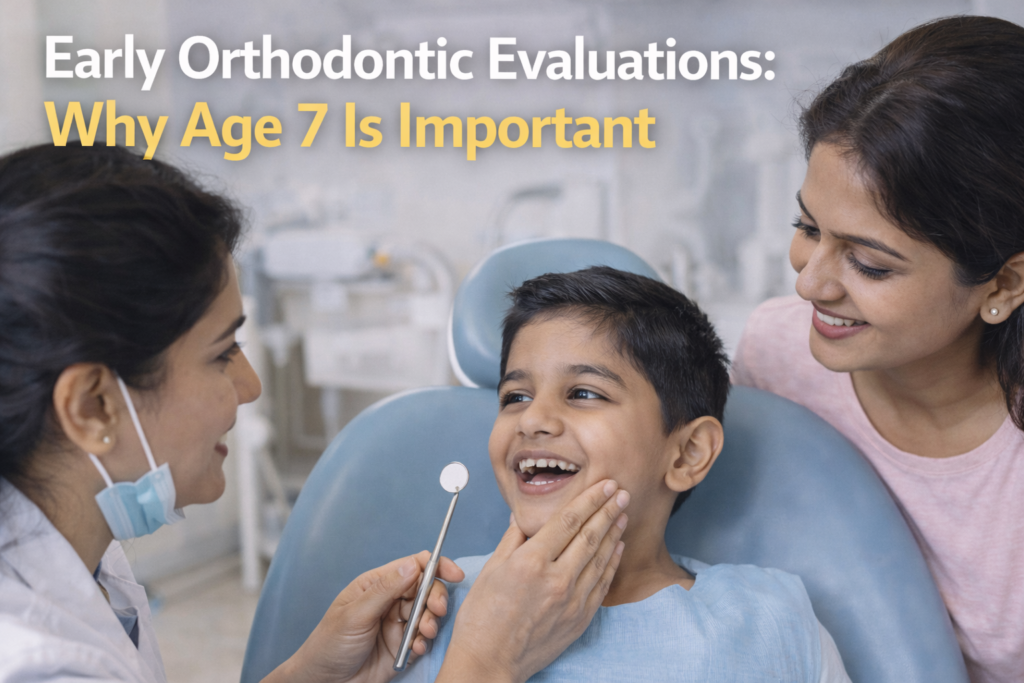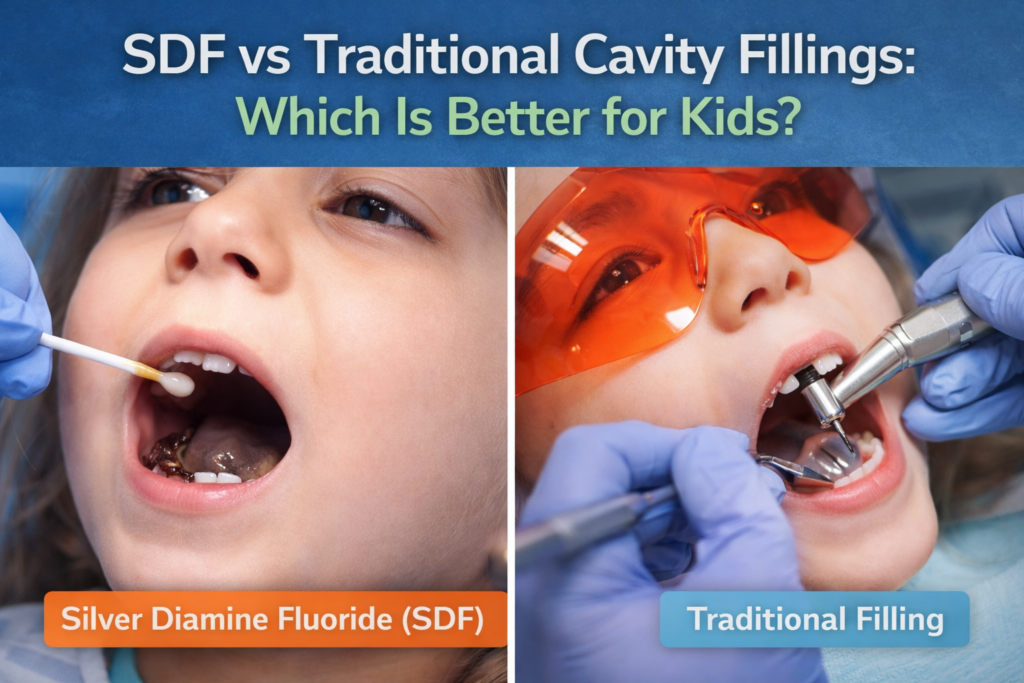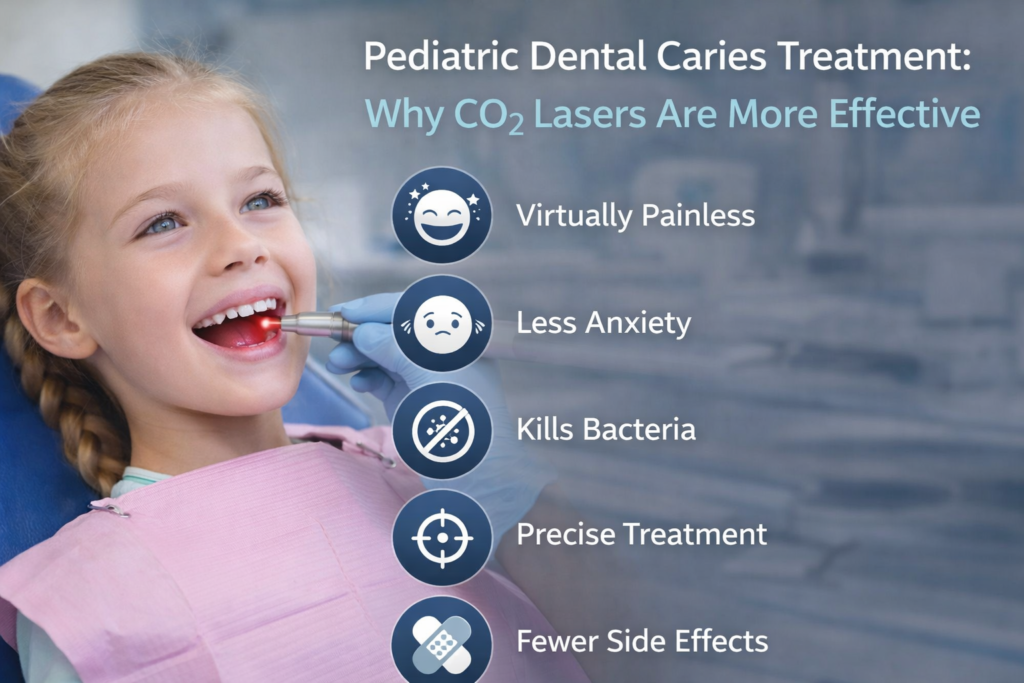As parents, ensuring the oral health of our children is paramount, and one common concern is early childhood cavities. Tooth decay in young children, also known as early childhood caries (ECC), can have lasting impacts on their dental health if not addressed promptly. At Soulful Dental Care, we understand the importance of early intervention and preventive measures to protect your child’s smile. Let’s explore the causes, prevention strategies, and treatment options for early childhood cavities.
What is Dental Cavities?
Dental cavities, also known as dental caries or tooth decay, are areas of damage on the surface of the teeth caused by bacterial activity. Cavities typically develop when plaque, a sticky film of bacteria and sugars, accumulates on the teeth. The bacteria in plaque produce acids that can erode the enamel, the outer protective layer of the teeth, leading to the formation of small holes or cavities.
If left untreated, dental cavities can progress deeper into the tooth, affecting the underlying layers of dentin and eventually reaching the nerve (pulp) of the tooth. This can result in pain, sensitivity, and, in severe cases, infection or abscess formation.
Preventing dental cavities involves practicing good oral hygiene, including brushing and flossing regularly, limiting sugary foods and drinks, and visiting the dentist for regular check-ups and cleanings. If cavities do develop, they can be treated with dental fillings, crowns, or other restorative procedures to repair the damaged tooth structure and prevent further decay.
Causes and Risk Factors for Early Childhood Cavities:
Early childhood cavities are primarily caused by the interaction of bacteria in the mouth with sugars from food and drinks, leading to the formation of plaque. Factors that increase the risk of ECC include:
- Poor Oral Hygiene: Inadequate brushing and flossing can lead to plaque buildup, increasing the risk of tooth decay.
- Frequent Bottle or Breastfeeding: Prolonged bottle or breastfeeding, especially at bedtime, can expose teeth to sugars for extended periods, promoting decay.
- Consumption of Sugary Foods and Drinks: Regular consumption of sugary snacks, juices, and sodas contributes to cavity formation.
- Lack of Fluoride Exposure: Insufficient fluoride intake or limited access to fluoridated water and toothpaste can weaken tooth enamel, making teeth more susceptible to decay.
Prevention Strategies for Early Childhood Cavities:
Treatment options for early childhood cavities vary depending on the severity of the decay and the age of the child. Here are some common treatment options:
- Fluoride Treatment: In cases where the decay is minimal and has not penetrated deep into the tooth, fluoride treatment may be sufficient. Fluoride helps to remineralize the enamel and prevent further decay. It is typically applied as a gel or varnish to the affected teeth.
- Dental Fillings: If the decay has progressed beyond the enamel and into the dentin, a dental filling may be necessary to restore the tooth. The decayed portion of the tooth is removed, and a filling material, such as composite resin or amalgam, is used to fill the cavity and restore the tooth’s shape and function.
- Pulpotomy: In cases where the decay has reached the pulp (the innermost part of the tooth containing nerves and blood vessels), a pulpotomy may be performed. During a pulpotomy, the infected portion of the pulp is removed, and the remaining healthy pulp is treated with a medicated filling to preserve the tooth’s vitality.
- Stainless Steel Crowns: For extensive decay that has compromised the structural integrity of the tooth, a stainless steel crown may be placed to provide strength and protection. Stainless steel crowns are durable and can withstand the forces of chewing in young children.
- Extraction: In cases where the decay is severe and extensive, and the tooth cannot be saved with other treatment options, extraction may be necessary. Extracting the decayed tooth can prevent further spread of infection and preserve the health of the surrounding teeth and gums.
It is essential to consult with a pediatric dentist to determine the most appropriate treatment plan for your child’s early childhood cavities. Early intervention is key to preventing further decay and preserving your child’s dental health.
Why choose Soulful Dental Care for Treatment Dental Cavities?
Choosing Soulful Dental Care for the treatment of dental cavities offers several advantages that prioritize your dental health and overall well-being. At Soulful Dental Care, we pride ourselves on our compassionate approach to dental care, ensuring that each patient receives personalized attention and treatment tailored to their unique needs. Our team of experienced dentists utilizes the latest techniques and technologies to provide high-quality dental services, including the treatment of dental cavities. From gentle cleanings to advanced restorative procedures, we are committed to delivering exceptional care in a warm and welcoming environment. Additionally, our emphasis on patient education empowers you to make informed decisions about your oral health, promoting long-term success and satisfaction with your treatment outcomes. When you choose Soulful Dental Care for the treatment of dental cavities, you can trust that you’re in capable hands, dedicated to helping you achieve a healthy, beautiful smile that lasts a lifetime.
Conclusion: Protecting Your Child’s Smile with Soulful Dental Care
Early childhood cavities can have significant implications for your child’s oral health and overall well-being. By understanding the causes, risk factors, and preventive measures for ECC, you can take proactive steps to safeguard your child’s smile. At Soulful Dental Care, our team of experienced pediatric dentists in Kothrud, Pune, is dedicated to providing compassionate care and personalized treatment to ensure your child’s dental health remains a top priority. Schedule a visit with us today to start your child on the path to a lifetime of healthy smiles.








